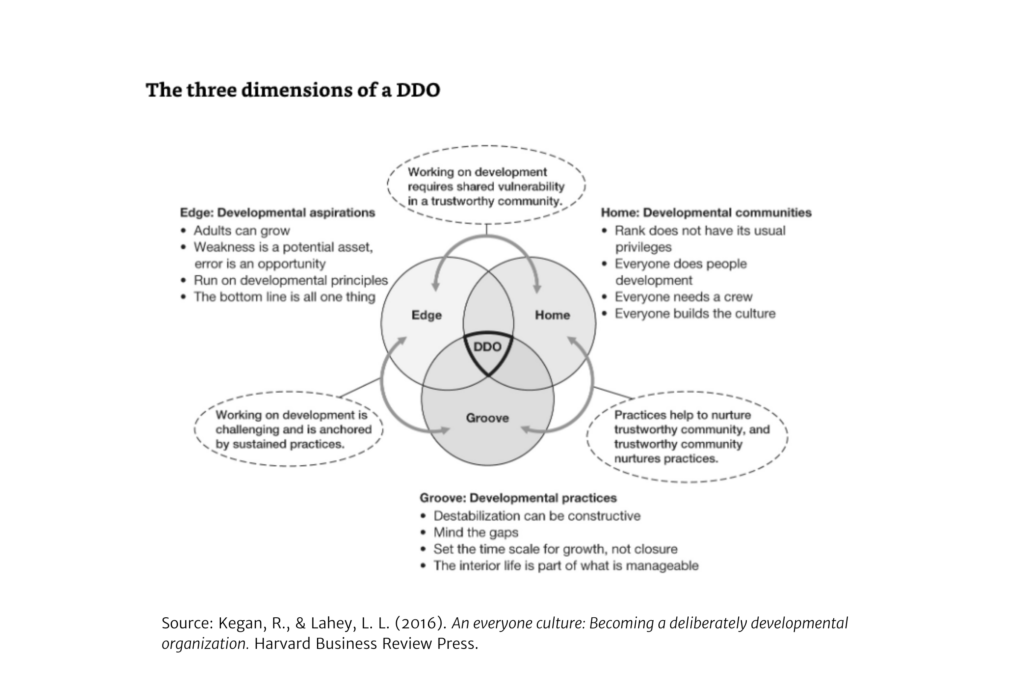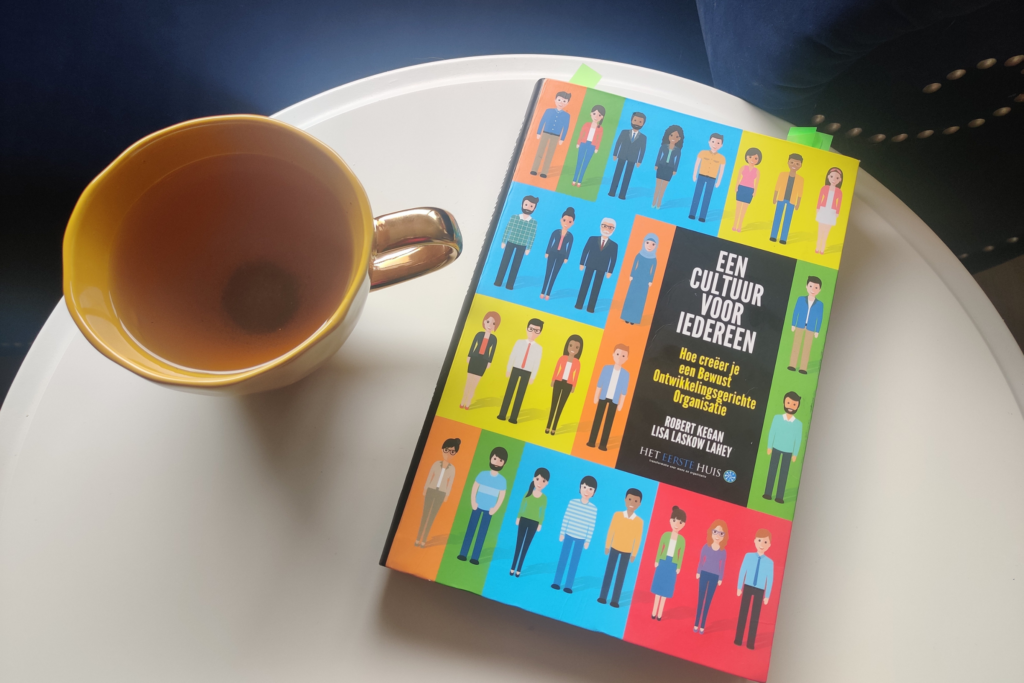Photo by Nele. Authors of the book: Robert Kegan and Lisa Laskow Lahey with Matthew L. Miller, Andy Fleming and Deborah Helsing
Becoming a Deliberately Developmental Organization (DDO)
This book was my first introduction to vertical development. One of the main authors is Robert Kegan, a pioneer in the study of adult development, and one of the most cited authors in the field.
The book starts with the following premise: “in an ordinary organization, most people are doing a second job no one is paying them for.” The authors convey that in organizations, large and small, in any country in the world, most people are spending time and energy covering up their weaknesses, managing other peoples impressions of them, showing themselves to their best advantage, hiding their uncertainties, hiding their limitations. Hiding.
They regard this as the single biggest loss of resources that organizations suffer every day. It prevents organizations and the people who work in them, from reaching their full potential.
The book introduces you to three organizations that are doing things differently. They point the way to a qualitatively new model for people development. The leaders of these organizations see one mission, not two. The relationship between realizing human potential and organizational potential in these companies is a dialectic, not a trade-off. In short, this book is as much about realizing organizational potential as it is about realizing human potential.
What is special about these organizations is that they are committed to a deliberately developmental culture in which every employee – from the most junior to the most senior – is given the opportunity to grow. They all are doing what the science of human development recommends, and they are doing so in ingenious and effective ways.
When I first started reading the book, I thought it was all rather strange. I had never encountered that kind of culture before. Towards the end of the book I thought just the opposite. That is how it should be. Focusing on the development of every person not only helps the organization move forward, but also the world we live in.
Note 1: Unfortunately one of the organizations in the book has since ceased to exist. Decurion (cinema complexes) did not survive the pandemic.
Note 2: This book is one of the few books relating to vertical development that have been translated into Dutch. Unfortunately, the translation is not great. Some concepts were translated incorrectly, such as the ‘socialised mind’, which in Dutch was translated to the ‘social mind’.
My key takeaway from this book
For a long time I was looking for an answer to the question: how to create psychological safety in organizations?
Psychological safety is not something you 'create', it's not the goal. Psychological safety arises organically when you deliberately invest in the development of every person in the organization.

What follows is a collection of my favorite passages and quotes from the book along with my own thoughts and ideas.
#1 A different perspective on organisations and management
Imagine so valuing the importance of developing people's capabilities that you design a culture that itself immersively sweeps every member of the organization into an ongoing developmental journey in the course of working every day. [
Imagine finding yourself in a trustworthy environment, one that tolerates - even prefers - making your weaknesses public so that your colleagues can support you in the process of overcoming that. [...]
You're imagining an organization that, through its culture, is an incubator or accelerator of people's growth. In short, you're imagining a deliberately developmental organization.
#2 What is 'development' in a DDO?
When we talk about a DDO, we use the term development very differently. We mean, not the development of a career. We aren't first talking about the business becoming bigger, but becoming a better version of itself. Businesses expand and careers flourish within a DDO, but these changes are consequences of the kind of development we're talking about; they are not the development itself.
What is "the development itself"? For more than a hundred years, researchers have studied the way human beings construct reality and have observed how that constructing can become more expansive, less distorted, less egocentric, and less reactive over time.[...]
Development is a specific, describable, and detectable phenomenon (the growth of our mind-sets, or meaning-making logics; qualitative advances in our abilities to see more deeply and accurately into ourselves and our worlds.
The field of adult development theory essentially describes how adults develop more comprehensive and complex ways of making sense of themselves and their experience. The terminology is not easy: constructive-developmental theory, integral theory, vertical development, stage development theory, … . It’s because there are several ‘schools’ of thinking each with their own frameworks, models and language. I chose to use the term ‘vertical development’, mostly for translation purposes (most of the other terms sound weird in Dutch). However, I’m not a 100% happy with this term either given the implicit hierarchy, that is already present in the model anyway (in combination with the Western view of hierarchy).
#3 Investing in the people = investing in the business
Although these companies develop their cultures as principled investments in their own business success, they also refuse to separate the people who make up the business from the business itself. Their big bet on a deliberately developmental culture is rooted in the unshakable belief that business can be an ideal context for people's growth, evolution, and a flourishing - and that such personal development may be the secret weapon for business succes in the future.
Though it’s not all sunshine and rainbows. Human development and growth is not easy. When investing in your vertical development things can get messy because you will discover your blind spots, weaknesses, anchors causing you to fall back to the basement of your development, etc… . This is all very human but there is no getting around the fact that this digging can be very uncomfortable.
The leaders of the DDO’s in the book are acknowledging this. Bryan Ungard, former COO at Ungard says: “When people hear ‘flourishing’, they think of appreciation and good feelings. But growth and development does not always equal ‘feeling good.’ Our culture is not about maximizing the minutes you feel good at work. We don’t define flourishing by sitting-around-the-campfire-moments.“
What makes development in a DDO different, is their perspective on these weaknesses, challenges, developmental opportunities, growth edges, or whatever you want to call it. The leaders of a DDO deeply believe that our weaknesses are pure gold if we will only dig into them.
#4 A conceptual tour of the DDO
We've found it useful to think of the conceptual structure of a DDO in terms of depth, breadth, and height-the depth of its developmental communities (which we call home); the breadth of its developmental practices (which we call its groove); and the height of its developmental aspirations (which we call its edge). Edge, home, and groove mutually reinforce one another, and together foster a deliberately developmental culture. These dimensions are like the three legs of a stool.

Taking one of the defining elements of the culture away and the organization can’t sustain being deliberately developmental. If you want to cultivate the quality of edge, then you’ll need to nurture trust and safety in a supportive community, and you’ll require a systemic orientation to practices that make a regular habit of uncovering and overcoming personal limitations.
Where do you start?
The book provides an answer to this question. To begin with, leadership is crucial: the perspective on human development, setting the stage, investing in the vertical development of leaders, etc. It is also important for an organization to develop its own development practices that can be implemented at all levels of the organization.
#5 Dare to do things differently
One of the most common experiences we have had in talking with people about the DDO is that the ideas bring up anxieties, which in turn can interfere with our listeners' thinking about these ideas. They get triggered, they stop listening, and they start doing what all of us do when we're triggered: they take care of themselves by fighting or fleeing.
And that in itself is a normal reaction. We are not used to this in a Western organization. BOO leaders are also frequently asked an identical question: “What do you do when you have to choose between profit and development?” The answer is equally idential: “You are presuming a tension we don’t experience. We don’t think about it like that.”
A DDO’s principles are rooted in the possibility of new life, of emergence, new capability, and evolution at the individual and collective level. In short, guided by the possibility of development.

